
Ragtime, also spelled rag-time or rag time, is a musical style that had its peak from the 1890s to 1910s. Its cardinal trait is its syncopated or "ragged" rhythm. Ragtime was popularized during the early 20th century by composers such as Scott Joplin, James Scott, and Joseph Lamb. Ragtime pieces are typically composed for and performed on piano, though the genre has been adapted for a variety of instruments and styles.

Scott Joplin was an American composer and pianist. Dubbed the "King of Ragtime", he composed more than 40 ragtime pieces, one ragtime ballet, and two operas. One of his first and most popular pieces, the "Maple Leaf Rag", became the genre's first and most influential hit, later being recognized as the quintessential rag. Joplin considered ragtime to be a form of classical music meant to be played in concert halls and largely disdained the performance of ragtime as honky tonk music most common in saloons.

Benjamin Robertson Harney was an American songwriter, entertainer, and pioneer of ragtime music. His 1895 composition "You've Been a Good Old Wagon but You Done Broke Down" is known as the second ragtime composition to be published and the first ragtime hit to reach the mainstream. The first Ragtime composition published was La Pas Ma La written by Ernest Hogan in 1895. The copyright for "You've Been a Good Old Wagon but You Done Broke Down" was registered in January of 1895 source, a few months prior to La Pas Ma La source, suggesting it was in fact the first of the two. During the early years of Harney's career, he falsely promoted himself as being the inventor of ragtime and never acknowledged the genre's black origin. Many contemporary musicians criticized him for it. Although ragtime is now probably more associated with Scott Joplin, in 1924 The New York Times wrote that Ben Harney "Probably did more to popularize ragtime than any other person." Time magazine called him "Ragtime's Father" in 1938.

Charles Luckyth Roberts, better known as Luckey Roberts, was an American composer and stride pianist who worked in the jazz, ragtime, and blues styles. Roberts performed as musician, band/orchestra conductor, and dancer. He taught music and dance. He also owned a restaurant and bar in New York City and in Washington, D.C. Luckey Roberts noted compositions include "Junk Man Rag", "Moonlight Cocktail", "Pork and Beans" (1913), and "Railroad Blues".
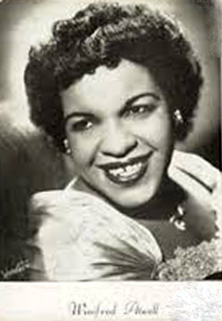
Una Winifred Atwell was a British pianist, born in the colony of Trinidad who migrated to Britain and who enjoyed great popularity in Britain and Australia from the 1950s with a series of boogie-woogie and ragtime hits, selling over 20 million records. She was the first black artist to have a number-one hit in the UK Singles Chart and had the first piano instrumental to reach number one in the UK Singles Chart, with “Let's Have Another Party” in 1954, and as of 2023, remains the only female instrumentalist to do so.
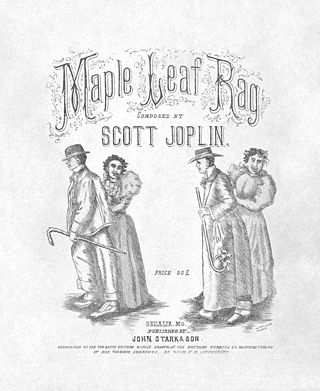
The "Maple Leaf Rag" is an early ragtime musical composition for piano composed by Scott Joplin. It was one of Joplin's early works, becoming the model for ragtime compositions by subsequent composers. It is one of the most famous of all ragtime pieces. Its success led to Joplin being dubbed the "King of Ragtime" by his contemporaries. The piece gave Joplin a steady if unspectacular income for the rest of his life.

George Botsford was an American composer of ragtime and other forms of music.

Thomas Million John Turpin was an American composer of ragtime music. Turpin is credited with the first published rag by an African American, his "Harlem Rag" of 1897.

Arthur Francis Collins was an American baritone who was one of the pioneer recording artists, regarded in his day as "King of the Ragtime Singers".
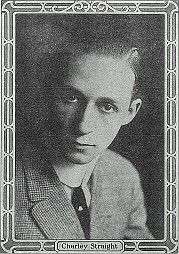
Charles Theodore "Charley" Straight was an American pianist, bandleader and composer.

"The Entertainer" is a 1902 classic piano rag written by Scott Joplin.
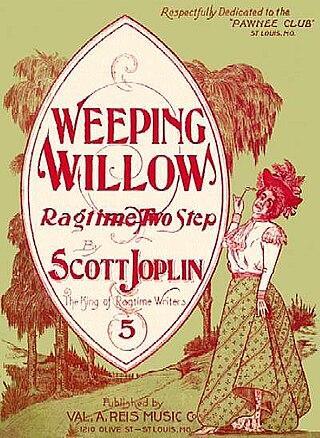
"Weeping Willow" is a 1903 classic piano ragtime composition by Scott Joplin. It was one of Joplin's simpler and less famous ragtime scores, written during a transitional period in his life, and one of the few pieces that Joplin cut as a piano roll in a 1916 session.
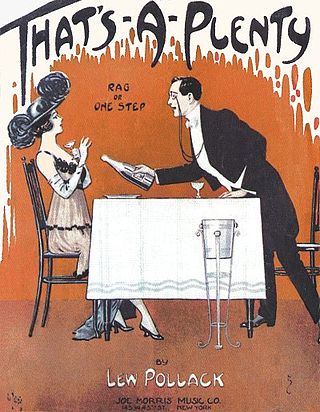
"That's a Plenty" is a 1914 ragtime piano composition by Lew Pollack. Lyrics by Ray Gilbert were added decades later. Several popular vocal versions have been recorded, but it is more often performed as an instrumental.
Julia Lee Niebergall was a musician and ragtime era composer.
Wallie Herzer(néWalter Henry Herzer; 15 April 1885 San Francisco – 15 October 1961 Redwood City, California) was an American composer of popular music, music publisher, and pianist. Herzer flourished in music prior to and during World War I.
U.S. Everlasting Records was an American record label which was in operation from 1908 to 1912. It issued two-minute and four-minute phonographic cylinders made of celluloid, and released over 1000 titles.

Frank P. Banta was an American pianist and recording artist active in the 1890s and 1900s.
Olly Oakley (1877–1943) was a British banjo player and composer. He was considered a prominent zither-banjo player in England. His music made up a part of early banjo recordings on the phonograph, and during his life, he became "the most widely recorded English banjoist". Other than his performing name of Olly Oakley, he alternately recorded under the pseudonyms Fred Turner, Signor Cetra, Jack Sherwood, Mr F Curtis, Frank Forrester, and Tim Holes.














